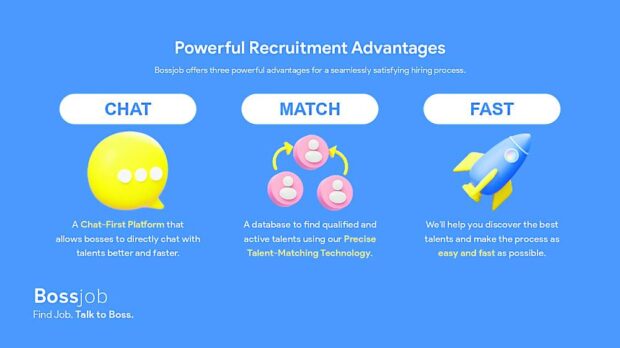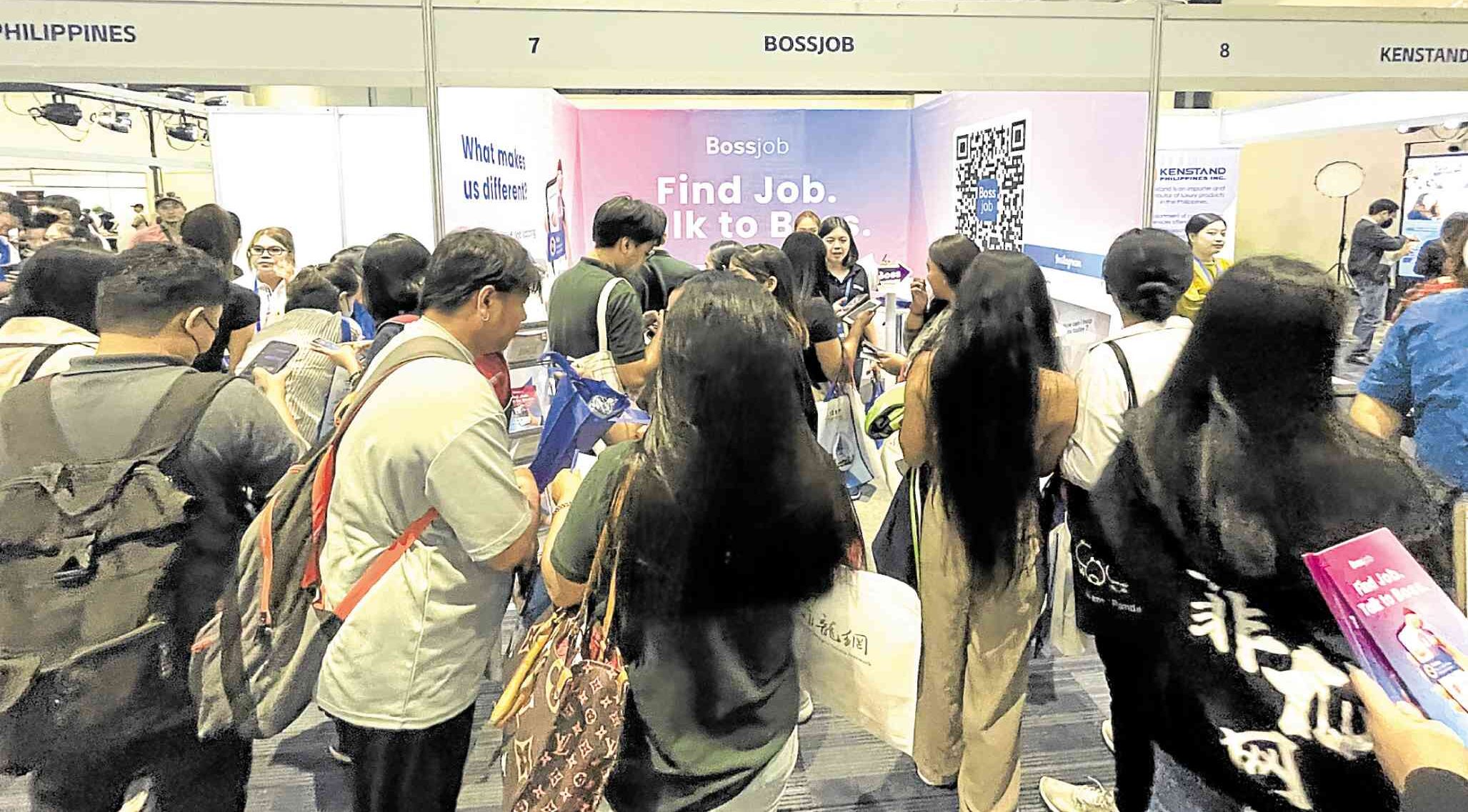‘Chat-first’ app trims ‘gap’ between job seekers, employers
Artificial intelligence (AI) is a gift that keeps on giving. It has limitless potential to reshape the way we work. Now, human resources (HR) managers are harnessing this gift to efficiently find the right person for the job.
Traditional method of recruitment is often a costly and time-consuming process for both job seekers and potential employers. Bossjob—a chat-first career platform for professional hiring in Southeast Asia—thus created the “mobile + direct chat + AI-matching” model as an auxiliary tool for HR managers to acquire talent.
Bossjob bridges the gap between job seekers and potential employers by allowing them to communicate directly through the “chat-first” feature. It also relies on AI algorithms and big data to connect quality talents with top companies.
Bossjob is the brainchild of Anthony Garcia and Singaporean Kiat How Quak. In 2017, Garcia started the fast-fashion e-commerce platform Kily.ph and was also in charge of recruitment. He used the dominant job-hunting platforms, but received very few applicants.
Garcia crossed paths with Kiat at a tech conference in Singapore. They bonded over their mutual enthusiasm for emerging technologies. Together, they envisioned a job-hunting platform that would benefit even startups and small businesses.
As they looked closer at the recruitment process, they unearthed HR pain points, such as the communication gap between job seekers and employers. “Legacy recruitment websites, created in the Web 1.0 era, have outdated matching capabilities and business models based on selling job ads and resumes, which don’t necessarily align with the current needs of employers,” explains Kimberly Chen, country manager at Bossjob.
Chen adds that the biggest problem in the recruitment industry is “information asymmetry” or the hidden information between recruiter and candidate. “The core problem to be solved by the recruitment platform is to promote the transparency and symmetry of information as much as possible, to improve the matching efficiency of both sides,” she adds.

HOW IT WORKS Bossjob’s chat-first hiring proposition —INFOGRAPHICS FROM BOSSJOB
Safety net
The “chat-first” feature of Bossjob is seen to help “facilitate immediate and genuine conversations” between employers and job seekers. “By harnessing the power of AI and big data, our platform recommends candidates who are not only qualified but are actively looking for employers. Similarly, job seekers are presented with opportunities that align with their skills, aspirations and career trajectory,” Chen explains.
The proliferation of deceptive online job listings prompted Garcia and his team to create safety nets to ward off cybercriminals. Fake job ads on social media lure aspirants with high salary and easy employment but only lead to websites that steal their credentials.
Garcia, now 34, believes that AI can take the lead role in ensuring that the online job recruitment arena remains a safe space.
“A more stringent and streamlined onboarding and verification process could be a way to put safeguards on ensuring the legitimacy of job ads. A hybrid approach of AI for screening and filtering, coupled with manual filtration, can be implemented to ensure a thorough verification process for both job seekers and employers,” he explains.
In addition, Garcia says AI can help pick only the most active and relevant content, eliminating outdated or duplicated postings.
“[I]ndustry players have the opportunity to reassess and realign their strategies toward safer job seeking for all. The shift toward integrating AI and other technological tools into the recruitment landscape could mark a turning point in the battle against fake job ads,” he says.
But it was a different story for Caren Mae Gregorio, who had used several job portals to search for opportunities. She thought it was a novel idea to check out the Bossjob app. She found that it was easy to use and offered a wide range of job listings.
“I did not expect that job hunting in the time of AI would be a lot easier because the app offers a wide range of recommended jobs that are relevant to my skill set. Thus, it clearly simplifies the job-hunting process,” she adds.
What she loves about the app is that job seekers can directly communicate with potential employers. The 34-year-old points out that having a platform where you can chat with your future employer reduces the anxiety of waiting for callbacks.
The entire recruitment process via Bossjob took less than a month, Gregorio says. “The hiring process is pretty fast,” she adds.
Human factor
Integrating AI into the recruitment scene reduces the time and labor costs. But both Chen and Gregorio agree that AI cannot supersede the human aspect.
“The downside is that AI cannot completely replace human judgment and decision-making, especially when hiring for positions that require a high degree of creativity and flexibility; and while AI can automate many hiring processes, it cannot replace the human interaction and emotional connection that [are] so important for building and maintaining employee relationships,” Chen explains.
“Recruitment comes hand in hand, and it’s always important to have a personal human connection between job seekers and employers that AI can’t provide,” Gregorio says.
But the model is constantly being tweaked. Chen points out that “some hidden information is difficult for AI tools to identify. [So] Bossjob will strengthen the training of AI models, improve the screening ability of algorithms, and make the preliminary screening work of recruitment more accurate and efficient.”
Since its launch in 2018, Bossjob now has more than 3 million registered users. It runs a job seeker chat rate of more than 80 percent; corporate response rate of 60 to 80 percent and a job matching degree of about 50 percent. It services more than 10,000 companies in the Philippines, including top companies like SM Investments Corp. and Accenture.
The platform is accessible through website (bossjob.com) and Bossjob app. Job seekers need to download and register for the app, log into their account and create a resume.
The Philippine-born platform recently raised $5 million as seed fund, which will be used for its expansion plans across Southeast Asia.
It recently launched a global multilanguage version, with its primary focus on Indonesia, Singapore, Hong Kong, Japan and other countries, with the end goal of serving global enterprises and talents.
Instead of relying on job advertisement views, Bossjob earns when companies pay for engagement with potential employees. “In the longer term, our engagement-driven pricing model ensures that startups and small and medium enterprises, despite having lower hiring budgets, won’t face any disadvantage when compared to the ad-driven pricing model used on other platforms,” Chen adds.
Companies can register on the platform for free, which Chen hopes will entice more companies to experience the convenience and efficiency offered by Bossjob.

